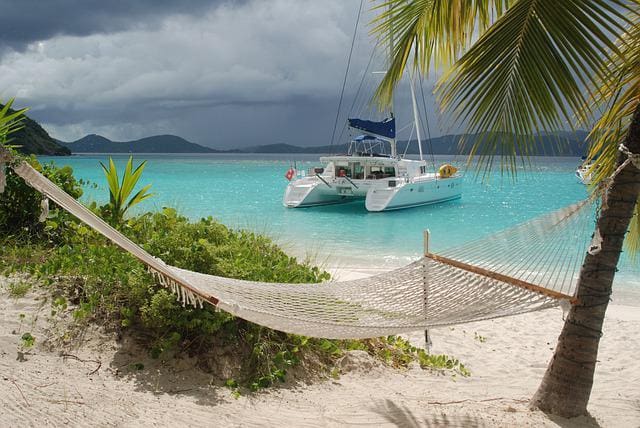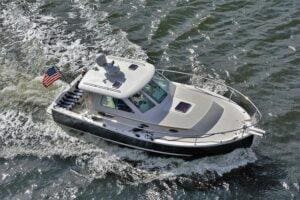Smooth-Sailing Boating Guide For Beginners

Boating For Beginners: A Guide For Smooth Sailing
We have heard time and again of the health benefits of being in water (swimming), but research has shown that there are also physical and mental health benefits of being on water. Boating is not only great fun, but it’s also soothing for the mind and body. But if you have never been on a boat before, it may seem complex and daunting.
Don’t worry — if you have bought or rented your first boat and are ready to start sailing, keep reading to learn about important terminology, rules, tips, and precautions for beginners.
Boating Terminology 101
If you’re just beginning your foray into boating, it’s important that you become acquainted with the necessary boating jargon. A few important terms include the following:
Distance And Navigation Terms
- Knot: Measure of speed; one knot equals one nautical mile (6076 feet) per hour
- Chart: A map a sailor might use for navigation
- Latitude: Coordinates running north or south of the equator
- Longitude: Coordinates running east or west of the equator
- Leeward: Being in the direction toward which the wind is blowing
- Windward: Being in the direction from which the wind is blowing
Boat Terminology
- Log: Record that details the operation of the boat
- Bow: Front section of the boat
- Stern: Rear section of the boat
- Port side: Left side of the boat
- Starboard: Right side of the boat
- Helm: The boat’s steering system
- Hull: Structure of the boat
- Rudder: Part used for steering
- Screw: The boat’s propellor
Safety Terminology
- Founder: To sink
- Personal floatation device (PLD): Device to keep people afloat in the water
- Lifeline: Lines along the boat’s deck that people can hold on to avoid falling off
- SOS: Sound signal sent out by boats in distress
- Visual distress signals (VDS): Device you can use to signal distress
Rules for Boating

Just like there are rules when driving a car on the road, there are also rules to ensure that you keep yourself and others safe while boating. Rules fall into multiple categories such as rules for channels and harbors, when sail meets power, and when power meets power.
However, as a boating beginner, there are a few rules that are more relevant for you than others. Basic rules to avoid collisions include:
- When you meet a boat on the same track as you, the leeward boat has the right of way.
- When two boats are on opposite tracks, the starboard track has the right of way.
- When one boat is overtaking the other boat, the overtaken boat (the boat ahead) has the right of way.
Knowing how to anchor your boat in the right way is just as important as the “ocean road rules” we’ve listed above. This is something that many beginners will shy away from until it’s too late. That’s why we’ve come up with our best collection of tips and tricks for anchoring your boat the RIGHT way.
Important Tips And Precautions For New Sailors
Get Training
Just like you can’t simply get in a car and drive it without training, you can’t begin sailing a boat without training either. You may learn to ride a boat from a boater friend or a professional instructor.
To find an instructor, all you need to do is perform a Google search. There may be boating clubs or marine organizations that can help you out.
Avoid Buying a Boat That’s Too Old
Like purchasing a car, there are many upsides to buying second hand. You can save a pretty penny if you know what to look for. However, just like buying cars secondhand, it’s easy to get stung or end up with a lemon if you don’t do your due diligence.
When purchasing or even renting a boat, make sure to bring along a sailor who knows what they’re doing. That way, you can avoid buying a project and set sail for clear waters.
If you’re looking for a reputable platform to buy and sell second hand boats, many experienced boat-owners sell with Grays. So whether you’re looking to sell and upgrade in the future, or looking to set sail for the first time, make sure to head over there and assess the myriad of options at your fingertips.
Get Your Sailing License And Registration
The paperwork you need depends on the type of boating you will be doing and where. The registration will depend, for instance, on whether you plan to sail on rivers, canals, or other waterways.
It will also depend on the purposes for which you use your boat — whether it is used as a houseboat, for cruising, or for another purpose.
Know The Relevant Laws
In the US, the US Coast Guard Rules are put in place to ensure safety, while other countries may have different laws.
These laws include, for instance, the rule that all people under 13 on a boat must be wearing a life jacket and that boat operators must not be intoxicated while operating a boat.
Stay Safe

Boating can be incredibly fun and chances of an accident are generally low. However, it is important to learn how to be safe by perusing a safety guide or taking a safety class.
Some important safety precautions are always wearing a life jacket and leaving a float plan on shore in case you run into an accident.
Have A First Aid Kit On Board
Sailing can sometimes cause injuries. A sudden wave might put you off balance, causing you to fall and hurt yourself. You might also get an especially bad sunburn or even sun poisoning. Or you might simply feel sick or have body pain.
A first aid box should be able to help address any minor health problems or injuries you have.
Take Along A Tool Box
It is highly unlikely that you will have a mechanic on board while sailing. So it is best to learn how to fix minor mechanical or technical problems yourself and keep a tool box with you, just in case. A toolbox should also include the essential boat cleaning tools to ensure that your boat stays ship shape for longer.
Check The Weather Before Heading Out
The weather can significantly impact your day out on your boat. Make sure that the weather is clear and there are no impending thunderstorms or expectations of heavy rain.
Alhough it is common sense that you’ll usually want to head out on those clear summer days and instead of monsoon season, make sure you’re fully equipped to deal with the blistering hot Australian summer sun as well. For some helpful tips and tricks, you can check out our guide to keeping the heat at bay whilst sailing.
Start Out With Shorter Trips
If you’ve just started sailing, try not to venture too far off and start out with shorter trips. By successfully making short trips, you will not only build confidence but also figure out how to resolve challenges and what equipment to have on hand.




